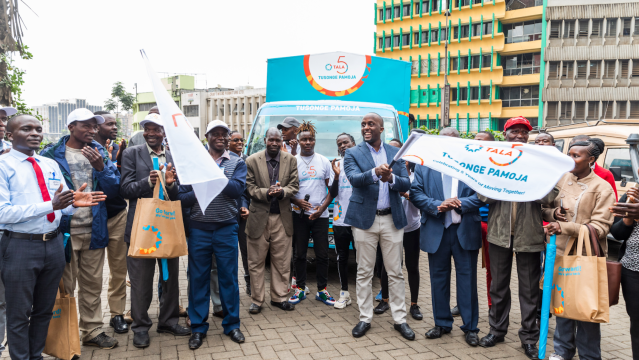Last month, as we approached the holiday season in Kenya, Tala decided to do something unusual: we urged customers not to take out loans. While others in the market were fueling holiday consumption, we showed customers how to budget for their Christmas celebrations and reminded them to spend money wisely. “So you guys instead of encouraging people to borrow you are discouraging them? Who is your marketing manager?” asked one customer on Facebook. “It’s just that you haven’t understood,” replied another. “There are people who borrow from [Tala and other lenders] so they mean we should borrow responsibly.”
For anyone watching, 2019 was a challenging year for the digital lending industry in Kenya. As the number of digital credit products in the Play Store continued to rise, formal financial inclusion increased, but so did indebtedness. Without functioning credit bureaus or loan stacking databases, consumers can borrow from multiple providers with ease. Many fall prey to unregulated lenders on the fringe of the industry who have neither the ability to underwrite them responsibly nor the incentive to invest in their financial well-being. In this environment, the promise of digital financial services – which have generational potential to bring convenience, security, and opportunity to billions who have been underestimated by traditional finance – seems at risk.
As a pioneer of the sector, we’re committed to doing our part to advance financial health and collaborating with other like-minded lenders on solutions. And we support and welcome regulations that would better safeguard consumers and build a vibrant digital lending industry. We learned a lot in 2019, and we share those learnings here in the hope that others in our sector will benefit and join us in taking action.
Voluntary self-regulation is a meaningful first step
In order to drive critical dialogue around consumer protection and support regulation of our industry, we knew we needed to bring other responsible lenders to the table. Beginning in 2018, Tala spearheaded the founding of the Digital Lenders Association of Kenya (DLAK), which we officially launched with 11 other lenders in June 2019. While we recognize the limits of voluntary self-regulation, DLAK members have established and committed to a code of conduct as a first step towards a more ethical industry and as a potential baseline for future regulation. This year, DLAK will continue to engage regulators and industry leaders to shape meaningful regulation that protects customers and supports sector innovation. Membership is open and we invite any lenders whose practices align with our code of conduct to join us.
Personalization enables protection
Our business success is based on our customers receiving loans that they can repay. The use of alternative data to underwrite means that every customer’s journey is tailored to their debt capacity and risk – from how we size their first loan to how quickly they graduate to higher limits and lower rates. Over the past year, we further invested in customizing these journeys to ensure that we are only lending to customers who can reasonably afford loans, and only providing loan sizes they can manage. This means that increasing access – in terms of customers and origination – is not our singular focus, and that the vast majority of our customers have continued to leverage Tala credit responsibly, even in a challenging economic environment.
Credit by itself is not enough
We developed our credit product to solve a clear consumer pain point, but liquidity isn’t the only challenge our customers face. When we learned that the number one reason for loan default was unexpected medical bills, we developed a pilot program with Turaco, an insurance company based in Kenya, to subsidize the cost of health insurance for select customers. We plan to continue scaling the pilot this year. We also know that our customers struggle to find reliable, affordable financial advice, so we’ve been piloting different types of financial education offerings. Over 90% of customers have opted into our mobile learning platform, and we’ve made a basic financial curriculum available for free in partnership with SOMO, a Nairobi-based social-impact entrepreneurship accelerator. Finally, given that many of our customers are new to credit and debt management, Tala is currently piloting and scaling a free financial coaching program to help customers plan and budget.
Our own practices and policies needed to evolve…
We heard anecdotally that debt collectors across the industry were engaging in unscrupulous practices, and we wanted to ensure we weren’t contributing to the problem. Over the summer, we implemented more secure technology, updated our policies, hired a new collections and servicing leader in our Nairobi office, and added a global operations compliance team member. We also commissioned a third party review of our collections practices. In the review, we identified instances where our agents did not meet Tala’s high standards for customer service and business integrity and we took immediate remediation steps. We continue to implement stricter and more frequent Quality Assurance monitoring, tighten our complaints processes and procedures, update the content and frequency of our team trainings, and let go any agents who violate our policies.
…but lenders can’t change the industry alone.
Kenya has made incredible strides in financial inclusion, but its credit reference system needs to evolve. To protect consumers from over-indebtedness, policymakers can engage with credit reference bureaus to adapt to the digital age by ensuring that they are set up to receive borrowing data in realtime. This or related efforts would allow all lenders to effectively prevent loan stacking. Regulators can also help those who have defaulted in the current system by providing simpler, cheaper ways for consumers to update their status with the bureaus (it’s currently over KSh 2000 to clear your name). These are just a few of the biggest opportunities, and we will continue to dialogue with other responsible lenders and the government to champion initiatives that protect consumers.
Our mission is to enable and accelerate financial health for all, and our commitment to our customers is unwavering. We won’t stop working to improve the industry, and we’ll continue to work to advance the right regulatory approaches and frameworks. We hope others will join us in learning from recent challenges and building a stronger, safer industry for Kenya – and for other countries where digital financial services are just now taking hold.
— Team Tala

